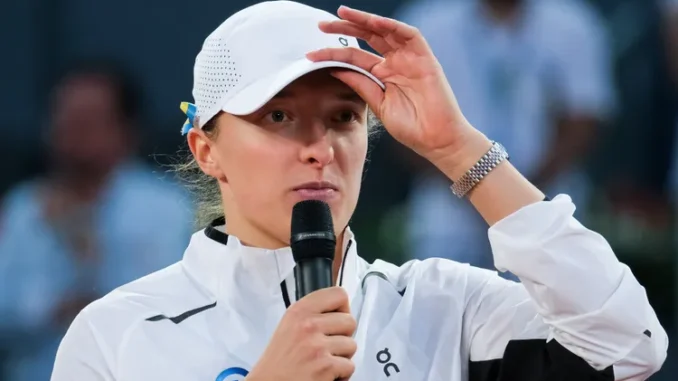
Iga Swiatek’s journey to the pinnacle of women’s tennis has been marked by remarkable success, but it hasn’t been without its challenges. While her on-court demeanor often exudes composure and focus, Swiatek has openly discussed her past struggles with managing emotions, revealing a side of herself that is both relatable and inspiring. Her reflections on these earlier experiences offer a glimpse into the dedication and self-awareness that have fueled her rise to the top, highlighting the importance of emotional regulation in achieving athletic excellence.
Swiatek’s story is one of continuous growth, both as a player and as an individual. While her talent was evident from a young age, she has acknowledged that mastering her emotions has been a crucial part of her development. She has spoken about instances in her younger years where frustration would boil over, leading to outbursts on the court. These moments, while perhaps embarrassing at the time, have become valuable learning experiences, shaping her understanding of the importance of emotional control in high-pressure situations.
The image of a young Swiatek throwing rackets is a stark contrast to the composed and focused player we see today. It underscores the journey she has undertaken, the hard work and self-reflection that have allowed her to channel her emotions in a more productive way. Her willingness to share these past struggles humanizes her, making her achievements even more impressive. It reminds us that even the most successful athletes are not immune to emotional challenges and that overcoming these challenges is an integral part of their success.
Swiatek’s reflections on her past struggles are not just about acknowledging past mistakes; they are about understanding the root causes of those emotions and developing strategies to manage them effectively. She has spoken about the importance of self-awareness, of recognizing the triggers that lead to frustration and developing coping mechanisms to deal with them in a healthy way. This process of self-discovery has been essential to her growth as an athlete, allowing her to harness her emotions rather than being controlled by them.
The ability to manage emotions is crucial in professional sports, particularly in a high-pressure environment like tennis. Players are constantly faced with challenges, both on and off the court. They must deal with the pressure of competition, the disappointment of losses, and the constant scrutiny of the public eye. For Swiatek, learning to control her emotions has been essential to her success. It has allowed her to stay focused on the task at hand, to maintain her composure in crucial moments, and to perform at her best even when facing adversity.
Swiatek’s journey is a testament to the power of self-improvement. She has not only honed her tennis skills but has also dedicated herself to developing her mental game. She has recognized that emotional regulation is not just a desirable trait for an athlete; it is a necessity. Her commitment to this aspect of her development has been just as important as her physical training and technical refinement.
Her story is also an inspiration to young athletes. It shows them that it is possible to overcome emotional challenges and achieve their goals. It reminds them that setbacks are not failures but opportunities for growth. Swiatek’s openness about her past struggles sends a powerful message: that it’s okay to make mistakes, it’s okay to struggle, but it’s crucial to learn from those experiences and keep moving forward.
Swiatek’s reflections on her past are not just about her own journey; they also contribute to a broader conversation about mental health in sports. By speaking openly about her struggles, she helps to destigmatize the topic and encourages others to seek help when they need it. Her willingness to share her experiences makes her a role model for aspiring athletes, showing them that mental well-being is just as important as physical fitness.
The contrast between the young Swiatek throwing rackets and the current world number one calmly dominating her opponents is a powerful illustration of personal growth and the transformative power of self-awareness. Her journey is a reminder that success is not just about talent; it’s about dedication, resilience, and the willingness to confront one’s own weaknesses. Iga Swiatek’s story is a compelling narrative of athletic excellence, but it’s also a story of human growth, demonstrating the power of emotional intelligence in achieving one’s full potential. And as she continues to achieve new heights in her career, her reflections on her past struggles serve as a valuable lesson for athletes and individuals alike.
Leave a Reply